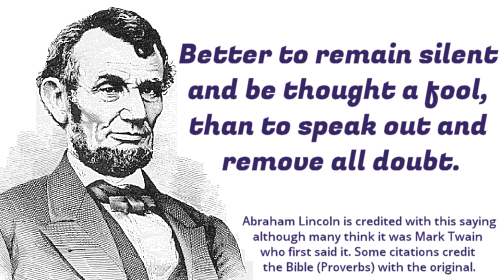In 2012, I blogged about this very topic. One ticked-off reader then attacked me on Twitter. A day later, both she and another member of The Alliance of Professional Health Advocates left the organization, both citing the post.
Ouch.
But it was good advice then, and it’s still good advice today. So at the risk of provoking additional readers, I’m going to wade into those waters again. Since most of us are self-employed, in the process of either starting or growing a professional practice, you’ll find that this advice will serve you very well, even if it IS maddening or frustrating to you.
Why now? Why this timing? What is it about this time that compels me to offer this advice again?
Because we’re already experiencing the heat of a new presidential election cycle. You can’t encounter news media without seeing, hearing or reading about a political candidate and what he or she said or did to incite voters.
And when we do – OH! – we immediately react with an attaboy or attagirl – or disgust – but rarely do we just experience that headline or story with complacency. Candidates’ stands on the issues, and often their behavior, are highly polarizing.
Politics and healthcare are so closely related they cannot be separated. The ACA/Obamacare, abortion rights, birth control, stem cell research… And it’s not just about politics and healthcare. Other lightening rod issues like the economy, gun control, foreign policy, immigration, global warming, gay and other civil rights….
Almost any political issue can come between you and your success as an independent, private, professional advocate.
Thus this advice for you – YOU, who are a new, relatively new, or soon-to-be business owner, someone who must now consider the well-being not just of yourself and your loved ones, but of your advocacy practice, too….
The advice:
Stay silent in public about politics, issues and your opinions. Period. In person, online, or anywhere but home.
Here’s why:
As a professional, you must be focused directly on your client and his or her needs. The minute the two of you disagree on an issue that stems from your personal ideologies, you risk losing objectivity and that focus. Unless you have met that client at a political rally where you’ve both been stumping for the same candidate, then you cannot know (and probably should not know) where they stand politically. They might agree with you – or they might not. They might see their perfect world the same way you do – and they might not. Because our political beliefs result from our cultural and religious beliefs, life experiences, and financial realities, we must acknowledge that there are just too many variables that may put us at odds with potential clients – the people we rely on for income so we can stay in business.
The minute either you or your client becomes aware of differences in your beliefs, research shows* a high likelihood those differences will affect your work together. Differences in ideology and diminished commonality lead to prejudice, even when we don’t realize it, even if we would deny it, even if we wish it weren’t true. It may be subtle. It may even be subconscious.
Most of us know this instinctively and we successfully overcome differences every day. But those differences aren’t necessarily ideological, which can be deeper and more subtle. Further, even if we, as professionals, believe we would have no problem overcoming ideological differences with our clients, we can’t be sure that client could see past ours.
For example:
You meet a potential client who needs help making cancer treatment decisions. You spend time doing an assessment, get to know him very well through the process, discover you know some people in common, you laugh together, and everything is going swimmingly. Looks like you’ll work together very well once he signs your contract…. until he mentions the latest presidential candidates’ debate and then makes a snarky little comment about women not being smart enough to be president.
Now how do you feel about your potential new client?
Then – you stick up for women and their potential as the country’s leader – go women!… But… will the client second guess whether or not he should hire you? Or – will you add to his stress levels and ability to heal if he does hire you? Will this issue create a wall between the two of you because now you know this man thinks women are second-class citizens? You can’t know. And you can’t know if it will affect outcomes.
So what are you supposed to do now? You might want to move the relationship forward with this potential client because you know you can help him. But trying to build a client relationship on what could become a foundation of disagreement, distrust or disdain, however slight, is no way to begin. That’s why it’s wise not to say anything at all – not to start the conversation yourself, certainly, and if the client brings it up, just not to take the bait.
If you’re still not convinced, then I challenge you to decide whether you are willing to risk your ability to succeed in your practice because you can’t keep your opinions to yourself.
(I’ll also ask you – have you ever had a political discussion with your doctor, or dentist, or vet, or hairdresser – or any other service provider? If you had that conversation and didn’t agree with them – what did that do to your relationship and your trust level? And if you’ve never had that conversation – well – it’s because they know better than to get into political discussions with their clients and patients.)
Look – I’m as opinionated as the next person – believe me! (You probably are, too!) I have specific beliefs and – yes – I know I am right 🙂 – (You know you’re right, too!) However, when it comes to my public persona, in my work, speaking, writing and leadership positions, online and off, I do take my own advice. Rarely, if ever, do I share my political beliefs away from home.

So that’s today’s advice: Do not mix your advocacy practice and professional relationships with politics. Don’t do it in person, on the phone, online (social media) or anywhere else. Like throwing gasoline on smoldering embers, it risks potential destruction of your ability to build your advocacy practice and help the people you want to help.
Let the ticked-off commentary begin.
(BTW – that ticked off reader who left her APHA membership – She’s no longer a practicing advocate. I have no idea if that relates to her unwillingness to publicly stay silent on political matters.)
- Previous Post:? Don’t Let Your Cause Be the Cause of Lost Business
LEARN ABOUT APHA MEMBERSHIP | FIND MORE REASONS PATIENTS NEED ADVOCATES
*Research about the roots of prejudice in a relationship:
- The Contributing Role of Prevalent Belief Systems to Intergroup Attitudes and Behaviors, Levy, S. R., West, T., & Rosenthal, L. (2012). The Contributing Role of Prevalent Belief Systems to Intergroup Attitudes and Behaviors. Online Readings in Psychology and Culture, 5(1). http://scholarworks.gvsu.edu/orpc/vol5/iss1/2/
- Processes of prejudice: Theory, evidence and intervention, Dominic Abrams, Centre for the Study of Group Processes, University of Kent, Equality and Human Rights Commission 2010. http://www.equalityhumanrights.com/sites/default/files/documents/research/56_processes_of_prejudice.pdf





Couldn’t agree more. Politics seem a no brainer. Wouldn’t think of it. I have to bite my lip, HARD on the vaccine issue. Also, a very heated issue. I have twin 10 yo grandsons that are on the Autism Spectrum. I’m a part time caregiver, so I’m an advocate for them as well and have a deep personal perspective. That said, a bloody lip it is. I’ve learned that I cannot change the countrys opinion, let alone argue with Big Pharma!! We have to pick our battles. One you are going to win or lose on principle or not, but business, most certainly.
P.S. I’m the one with the bloody lip, in case we ever meet ?
I am in total agreement with your position, Trisha. Nothing will squelch a professional (and sometimes personal!) relationship faster than disagreements about politics and religion, among other topics. Anything that has the potential of compromising the focus on and quality of service for the client or customer (in any business) should be left at the door. Thank you for the reminder!
Good Advice and something I am sure I needed to be reminded of as I launch my own personal health advocacy practice. I adhered to this reasonably well as a publicly employed nurse, but I had the cushion of an employer if a difference did occur. I have had patients question me in regard to my politics or my religious beliefs too, and watched them “stiffen” when I replied that I preferred not to discuss personal belief while working. It’s a tricky thing, this balance of socialization; but what I want to impress most upon my patients is deeply involved with both my personal, spiritual and political stance. I want to impress upon them the meaning of autonomy; the idea that we are all capable of self-governance. While it is true we live in a society governed by various written and unwritten laws, rules, mores, and a tremendous amount of opinions, this right and responsibility of autonomy, self-control and self-care, remain of primary importance.
Here’s the thing about political beliefs…. People. Are. Polarized. And, if you don’t share their beliefs, you are the enemy, or worse – stupid.
Currently, 47% of the country identifies as democratic, or leans democratic, while 38% identify or lean republican. Which means, you can alienate no less than 38% of your client base (independents seem much more forgiving) by making political statements in a meeting or on social media.
Best advice I can give to those who just cannot stop themselves from commenting on a local newspaper article posted on facebook, or shooting off a judgy, polarizing tweet, or making some absurd comment on youtube is to CHANGE YOUR NAME on your social media accounts. I did, and not because I make crazy comments these days…but because I can’t go back in time to 10 years ago and weed out every potentially offensive comment I have ever made. So, I changed my name to something totally unrecognizable to the outside world. If I use an account socially, I don’t use a photo of my face (my gmail photo is my photo, but I don’t make political comments with my gmail account…). Also, my profiles are set to UBER private. Like, set off an e-electric fence private! If you can’t stop yourself, anonymize yourself!
To take this topic a little further…
Remember, when it comes to politics – the more right you think you are, the less right you are capable of being! We all need to step back and remember that the other side exists for a reason, and it isn’t because they are wrong 100% of the time, or are evil or wasteful…we just don’t agree. If you can’t understand that your opinions are OPINIONS, then the judgement, resentment, or anger you feel is written all over your face. If a client says they HATE the ACA and Obama and you are a staunch democrat, you still need to HEAR YOUR CLIENT. Don’t think to yourself “omg, this woman is so WRONG” because you will fail to hear the rest of what she has to say. We need to be the ultimate mediators in this job, and that means internal as well as external.